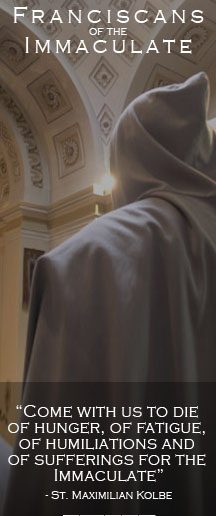The saints form part of the inexhaustible treasure of the divine mystery; before the eyes of men they at once reveal themselves and are enigmatic.
So it is that the figure of St. Maximilian Kolbe, martyr of Auchwitz who offered his life in place of a condemned father of a family, and who conducted a feverish missionary and editorial work in his Cities of the Immaculate in Poland and Japan, could hardly have escaped the notice of his contemporaries. The person and personality of St. Maximilian, in all of their dimensions, reveal a mystery, inviting one to delve deeper into this same mystery.
St. Maximilian’s vow of total consecration to the Immaculate, the fruit of a mystical intuition, is deeply rooted in the fertile ground of Franciscan tradition. Fr. Kolbe was the worthy heir of this patrimony, developing and passing on this tradition, preparing the ground through a life of prayer which came to define his existence.
What is the secret of this great prophetic spirit of the twentieth century? Who could not be inspired to uncover the mystery underlying the person and activity of this “special patron of our difficult times?” His biographies and the testimonies of those who knew him personally, consistently reveal the picture of a man who had entered into a childlike intimacy with God. His life was one of continual silence and recollection, never disturbed by the feverish activity of his publishing apostolate.
Those who knew him personally recall that the Polish Saint always carried a rosary in hand, often concealed underneath his capuche. He thus prayed with discretion and with conviction. Nonetheless, he believed “that when the flame of love is kindled, it cannot be contained within the heart; it grows and inflames other hearts.”1
If prayer is the point of departure in one’s quest for sanctification, it is also the motor for inspiring others to embark on this same quest, and it becomes indispensable for the formation of the missionary. Remarkably, it is a way unfamiliar to many, and yet it is the perennial and infallible means for restoring peace and happiness to the soul and bringing it closer to God. Prayer renews the world. Prayer is necessary for restoring life to every soul. By means of prayer, St. Thèrése of Lisieux became the patroness of the missions without ever leaving the confines of her convent.
“External activity is good,” St. Maximilian wrote, “but clearly it is something of secondary rank. And even less is its importance when compared with the interior life, the life of recollection, of prayer, the vigor with which we exercise a personal love for God.” 2
In the privileged place St. Maximilian assigned to prayer, both in his life and that of his friars, we can recognize the dispositions of his Seraphic Father, St. Francis of Assisi. Was not the Poverello’s constant colloquy with God the source of his desire to convert souls and the origin of his first great missions? How could that first Franciscan community in the time of St. Francis be anything other than fruit of prayer? The desire of St Francis and St. Maximilian for the sanctification of souls reveals their goodness and their example as models of prayer. The prayer of both was translated into concrete action and results, as one can behold in the fruits of conversion and of the apostolate. They teach us that prayer does not stop at dialogue with God; it means relying on God’s help to realize a vast missionary program for the sanctification of souls.
Thus, progress in the spiritual life and apostolic success depend upon prayer and union with God. Discerning God’s voice in meditation and doing his will is the foundation for progress in the practice of virtue and in evangelization. Even the mightiest apostolic works, such as the foundation and operation of the Cities of the Immaculate, depend upon prayer. Indeed, St. Maximilian tied the progress of missionary activity to prayer: “The value of every Niepokalanow depends solely and exclusively on the life of prayer.” 3
What were some of the characteristics of the prayer of St. Maximilian? First of all, it was humble: “Relying on our own forces, on our own, without divine help, we cannot do anything. All that we are anything that we have or can do, we have from God, and we receive it from God at every moment in our life.”4 Aware of his own frailty and blindness, St. Maximilian abandoned himself to God’s salvific and providential action, which sustained, fortified and sanctified him.
Another important characteristic of his prayer was that of perseverance and trust. He was accustomed to interrupting his intense apostolic activity with brief visits to the Blessed Sacrament, or with a prayer of the heart raised to the Most High or to the Immaculate.
Fr. Kolbe’s trust in divine Providence was without reserve, because he understood that God not only knows and permits the often-difficult situations of everyday life, but he can draw a greater good out of even the most tragic circumstances. St. Maximilian demonstrated the maximum trust in God’s providential love, especially during the last years of his life when he had reached spiritual maturity, when he had entered fully into the joy of the mystical phase of the spiritual itinerary. He had placed himself continually in the presence of God to praise, adore and exalt him for his perfection and his gift of salvation.
Sentiments of praise, adoration and thanksgiving frequently sprung forth from St. Maximilian’s heart for the gift of the Immaculate, as nobly demonstrated by his prayer to the Holy Trinity:
I adore you, O our heavenly Father, because you placed in the most pure womb of Mary your only-begotten Son. I adore You, O son of God, because You condescended to enter the womb of Mary and became truly her actual Son. I adore you, O Holy Spirit, because you deigned to form in her immaculate womb the Body of the Son of God. I adore you, O most Holy Trinity, O one God in the Holy Trinity, for having ennobled the Immaculate in such a divine way. And I will never cease daily, from the first moment I awake, to adore you most humbly, O Divine Trinity, with my face to the ground, repeating three times: Glory be to the Father, and to the Son, and to the Holy Spirit. As it was in the beginning, is now, and ever shall be, world without end. Amen.5
We see in St. Maximilian’s prayer the perception of a Triune God who is infinite, omnipotent and most high, and yet is also near to his heart. This prayer reveals once again the similarity of the spiritual path he traveled with that of St. Francis of Assisi. The words of St. Maximilian also reveal the dimension of thanksgiving. According to the Saint, man receives all of his spiritual good at the hands of the universal Immaculate Mediatrix. Everything is a gift of divine Providence through the Immaculate.
A final important characteristic of Kolbean prayer is supplication. God placed in the heart of St. Maximilian an overwhelming desire to accomplish his will and to be a missionary worthy of bringing the Good News to others, giving authentic witness through a life of virtue and love for the brethren. For his part, St. Maximilian placed these desires constantly before Our Lord.
Translating his humility and perseverance, his gratitude and supplication into the expressions of prayer, St. Maximilian lived his life on earth in full communion with God, accomplishing his will in its entirety. He edified his brothers in religion and others with whom he came into contact; and to the present day, he continues to edify all those who read his writings, who find in them the product of a man inflamed with apostolic zeal, but above all a man defined by prayer.
Footnotes
1 – Gli Scritti di San Massimiliano Kolbe, Florence, Italy, 1975-78 (SK) 1325.
2 – SK 903.
3 – SK 925.
4 – SK 1100
5 – SK 1305

